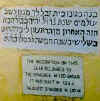|
|
||||
| Home
Society & Culture Traditional
Cultures
'Spirit of India' Jews
of India Technology Feature Technology
Investments
Films
|
|
|
||
|
the-south-asian.com March 2001 |
||||
|
Page 1 of 6
'the-south-asian' special feature
"Perhaps the most unique aspect of the Indian Jewish experience is the complete absence of discrimination by a host majority. The secret of India's tolerance is the Hindu belief which confers legitimacy on a wide diversity of cultural and religious groups even as it forbids movement from one group to another." - Raphael Meyer
The earliest Jews came to India two thousand years ago. They were escaping persecution in Galilee. Some came after the destruction of the Second Temple in 70CE. The Sephardic Jews came to India from western European nations such as Holland and Spain. The 16th and 17th century migrations created important settlements of Jews from Persia, Afghanistan, and Khorasan (Central Asia) in northern India and Kashmir. In the 17th and 18th centuries, Jewish settlers came from the Middle East and North Africa. Jews settled in different areas – from Kashmir in the north, to Cochin in the south, Calcutta in the east and Bombay (renamed Mumbai) in the west. By the late 18th century, Bombay became the largest Jewish community in India. Today only a few thousand remain in India - most having migrated to Israel, England, USA, and Australia. They have left behind them a rich legacy of synagogues, public institutions, and nostalgia. Only two synagogues remain open in Calcutta (Kolkata) for its 60 odd Jewish population. The Pardesi synagogue in Cochin, Kerala is the oldest among the surviving synagogues in the country. It is a National Heritage.T he largest concentration of Jews in India still remains in Bombay (particularly in Thane, a suburb of Bombay) - but they are only about 4000 in number - a mere fraction of the vitality they once generated in the city. Some Eminent Jews of India "Israel is in my heart but India is in my blood." - Ezekiel Malekar, Delhi There have been many among them who rose to national stature - (Late) Mrs Hannah Sen, was the President of All India Women’s Conference and also the first lady director, Lady Irwin College for Women, Delhi (Late) Mr Ezra Kolet did pioneering work for the Government in the shipping industry. Mr J. M. Benjamin, former Chief Architect to the Government of India, and former secretary, Delhi Urban Arts Commission, continues to strive to make Delhi a beautiful and habitable place. Haffkine, after whom the famous Haffkine Institute in Bombay (Mumbai) has been named. The Sassoons, after whom the Sassoon docks, the Sassoon hospital, and two of Mumbai's well known sites - the Jacob Circle, and Flora Fountain have been named. Dr. E. Moses was Mayor of Bombay Maj. Gen. Samson who was awarded the Padma Bhushan,
and a few other Jews reached prominence in the Indian Armed Forces. Poet Nissim Ezeickel, and cartoonist Abu Abraham The actress/dancer Helen, and also the late famous Hindi film actor David, and the late Sulochana - the Queen of Indian Silent Films. Dr. Erulkar was the personal physician/friend of Mahatma Gandhi. His father, also a doctor, Abraham Erulkar, donated land for the synagogue in Ahmedabad, Gujarat. Dr. Erulkar's daughter became the 1st lady of Cyprus, married to the President of Cyprus. Dr. Jerusha Jhirad was awarded Padma Shri by the Government of India. ___________________
|
||||
| Copyright © 2000 [the-south-asian.com]. Intellectual Property. All rights reserved. | ||||
| Home |
